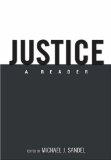Summary | Excerpt | Reading Guide | Reviews | Beyond the Book | Readalikes | Genres & Themes | Author Bio

Critics' Opinion:
Readers' Opinion:
First Published:
Sep 2009, 320 pages
Paperback:
Aug 2010, 320 pages
 Book Reviewed by:
Book Reviewed by:
Micah Gell-Redman
Buy This Book
The greed critique was voiced not only by the tabloids, but also (in
more decorous versions) by public officials. Senator Sherrod Brown
(D-Ohio) said that A.I.G.’s behavior “smacks of greed, arrogance, and
worse.” President Obama stated that A.I.G. “finds itself in financial
distress due to recklessness and greed.”
The problem with the greed critique is that it doesn’t distinguish
the rewards bestowed by the bailout after the crash from the rewards
bestowed by markets when times were flush. Greed is a vice, a bad attitude,
an excessive, single-minded desire for gain. So it’s understandable
that people aren’t keen to reward it. But is there any reason to
assume that the recipients of bailout bonuses are any greedier now
than they were a few years ago, when they were riding high and reaping
even greater rewards?
Wall Street traders, bankers, and hedge fund managers are a hardcharging
lot. The pursuit of financial gain is what they do for a living.
Whether or not their vocation taints their character, their virtue is
unlikely to rise or fall with the stock market. So if it’s wrong to reward
greed with big bailout bonuses, isn’t it also wrong to reward it with
market largess? The public was outraged when, in 2008, Wall Street
firms (some on taxpayer-subsidized life support) handed out $16 billion
in bonuses. But this figure was less than half the amounts paid out
in 2006 ($34 billion) and 2007 ($33 billion). If greed is the reason
they don’t deserve the money now, on what basis can it be said they
deserved the money then?
One obvious difference is that bailout bonuses come from the taxpayer
while the bonuses paid in good times come from company earnings.
If the outrage is based on the conviction that the bonuses are
undeserved, however, the source of the payment is not morally decisive.
But it does provide a clue: the reason the bonuses are coming
from the taxpayer is that the companies have failed. This takes us to the
heart of the complaint. The American public’s real objection to the
bonuses—and the bailout—is not that they reward greed but that they
reward failure.
Americans are harder on failure than on greed. In market- driven
societies, ambitious people are expected to pursue their interests vigorously, and the line between self-interest and greed often blurs. But
the line between success and failure is etched more sharply. And the
idea that people deserve the rewards that success bestows is central to
the American dream.
Notwithstanding his passing reference to greed, President Obama
understood that rewarding failure was the deeper source of dissonance
and outrage. In announcing limits on executive pay at companies receiving
bailout funds, Obama identified the real source of bailout outrage:
This is America. We don’t disparage wealth. We don’t begrudge anybody
for achieving success. And we certainly believe that success
should be rewarded. But what gets people upset—and rightfully
so—are executives being rewarded for failure, especially when those
rewards are subsidized by U.S. taxpayers.
One of the most bizarre statements about bailout ethics came from
Senator Charles Grassley (R-Iowa), a fiscal conservative from the
heartland. At the height of the bonus furor, Grassley said in an Iowa
radio interview that what bothered him most was the refusal of the
corporate executives to take any blame for their failures. He would
“feel a bit better towards them if they would follow the Japanese example
and come before the American people and take that deep bow
and say, ‘I’m sorry,’ and then either do one of two things—resign or go
commit suicide.”
Grassley later explained that he was not calling on the executives to
commit suicide. But he did want them to accept responsibility for their
failure, to show contrition, and to offer a public apology. “I haven’t
heard this from CEOs, and it just makes it very difficult for the taxpayers
of my district to just keep shoveling money out the door.”29
Grassley’s comments support my hunch that the bailout anger was
not mainly about greed; what most offended Americans’ sense of justice
was that their tax dollars were being used to reward failure.
Excerpted from Justice: What’s the Right Thing to Do by Michael J. Sandel. Published in September 2009 by Farrar, Straus and Giroux, LLC. Copyright © 2009 by Michael J. Sandel. All rights reserved.





The Funeral Cryer by Wenyan Lu
Debut novelist Wenyan Lu brings us this witty yet profound story about one woman's midlife reawakening in contemporary rural China.
Your guide toexceptional books
BookBrowse seeks out and recommends the best in contemporary fiction and nonfiction—books that not only engage and entertain but also deepen our understanding of ourselves and the world around us.